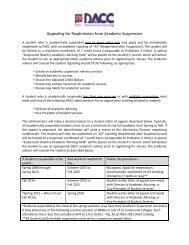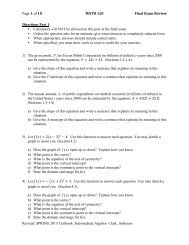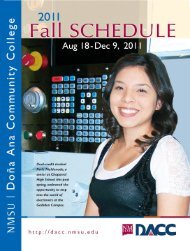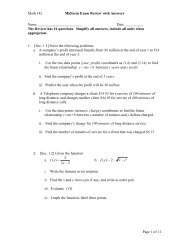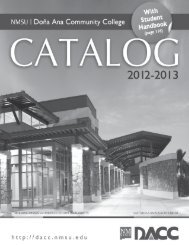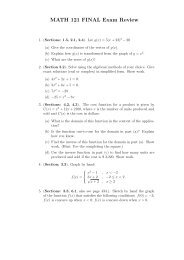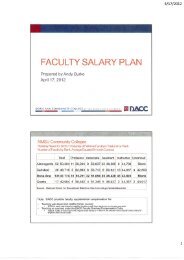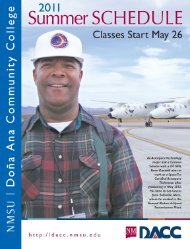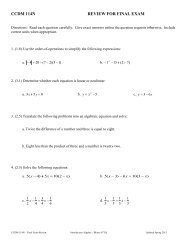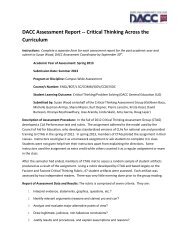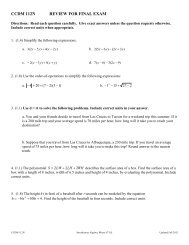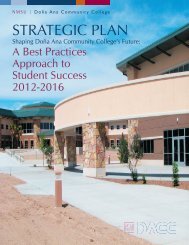online - Dona Ana Community College - New Mexico State University
online - Dona Ana Community College - New Mexico State University
online - Dona Ana Community College - New Mexico State University
Create successful ePaper yourself
Turn your PDF publications into a flip-book with our unique Google optimized e-Paper software.
stallation mechanics, service technicians, operating engineers,<br />
maintenance foremen, and trained crews to keep complex environmental<br />
systems operating efficiently.<br />
The heating, air conditioning, and refrigeration industry is one of<br />
the country’s most stable. The supply of qualified, trained people<br />
has not kept pace with the demand, and new opportunities are constantly<br />
developing. The demand for trained HACR graduates is also<br />
increasing due to Environmental Protection Agency requirements<br />
that refrigerants be handled by a certified technician.<br />
Technicians knowledgeable in heating, air conditioning, and refrigeration<br />
are also needed in defense, space exploration, and<br />
manufacturing. Because climate control is important wherever<br />
microprocessors are used in manufacturing or scientific research,<br />
skilled technicians are in demand in these fields. Many experienced<br />
technicians own and manage their own businesses.<br />
The Heating, Air Conditioning and Refrigeration program at DACC<br />
uses training facilities equipped with the most modern test equipment<br />
and tools available. As a student, you will learn to—<br />
• service, repair, and maintain heating, air conditioning, and refrigeration<br />
systems;<br />
• read and interpret technical drawings, schematics, and symbols<br />
in order to diagnose and troubleshoot problems in a system;<br />
• evaluate, diagnose, and service various mechanical and electrical<br />
controls;<br />
• apply the mathematics related to the heating, air conditioning,<br />
and refrigeration trade;<br />
• handle customer relations, shop management procedures, and<br />
record keeping relative to the trade;<br />
• properly use special tools and testing equipment.<br />
• become certified in Section 608, EPA certification.<br />
A unique cooperative training program is offered during the final<br />
semester to provide students with field experiences. Working side<br />
by side with journeymen technicians, students are offered an opportunity<br />
to practice and refine their new skills.<br />
After the first semester, full-time heating, air conditioning, and refrigeration<br />
students must purchase a personal set of technician’s<br />
tools (approximate cost, $850). The tool set includes the basic tools<br />
that most employers require on the job. Part-time students will purchase<br />
only those tools required by the specific course(s) in which<br />
they are enrolled.<br />
Students will also provide their own medical/accident insurance.<br />
They need to be in good physical condition and possess the ability<br />
and desire to work with their minds and hands.<br />
The curriculum is competency based and uses multimedia classroom<br />
instruction and hands-on laboratory exercises. Classroom and<br />
laboratory hours are listed in the Schedule of Classes.<br />
All heating, air conditioning, and refrigeration students are eligible<br />
to join SkillsUSA. Membership provides students an opportunity to<br />
develop their leadership skills and to become proficient in public<br />
speaking and parliamentary procedure. SkillsUSA also offers students<br />
a chance to demonstrate their occupational skills. Skill competitions<br />
are conducted each year in <strong>New</strong> <strong>Mexico</strong> for all postsecondary<br />
students.<br />
During the last semester prior to graduation, students will be required<br />
to take the Industry Competency Examination (ICE) or other<br />
approved national competency examinations. There will be an additional<br />
testing fee.<br />
Associate Degree (67 credits)<br />
NOTE: Students must receive a final grade of C or better in all required OEAR<br />
courses. Courses appearing in italics may be applied toward a bachelor’s<br />
degree at NMSU.<br />
OR<br />
OR<br />
OR<br />
OR<br />
OR<br />
OR<br />
OR<br />
Core Requirements<br />
13 credits<br />
BOT 209 Business & Tech. Communications 3<br />
ENGL 203G Business & Prof. Commun.<br />
ENGL 218G Technical & Scientific Comm.<br />
COMM 253G Public Speaking 3<br />
COMM 265G Prin. of Human Comm.<br />
ENGL 111G Rhetoric and Composition 4<br />
PSY 201G Introduction to Psychology 3<br />
SOC 101G Introductory Sociology<br />
Related Requirements<br />
17 credits<br />
C S 110 Computer Literacy 3<br />
OECS 105 Intro. to Microcomputer Tech.<br />
OECS 227 Comp. Applic. for Technicians<br />
OETS 118 Mathematics for Technicians 3<br />
OEBU or any ECON approved elective 3<br />
Electives chosen from among the following: 8<br />
OEAR 104, 110, 220, and 225; OEWT 102;<br />
and/or other approved elective(s)<br />
Technical Requirements<br />
37 credits<br />
OEAR 100, EPA Clean Air Act: Section 608 1<br />
NOTE: A fee of $45 is required for study guide and testing;<br />
must pass Type 1 and Type 2 tests.<br />
OEAR 101 Fundamentals of Refrigeration 4<br />
OEAR 102 Fundamentals of Electricity 4<br />
OEAR 103 Electrical & Mechanical Controls I 4<br />
OEAR 205 Commercial Refrigeration Systems 4<br />
OEAR 207 Residential Air Conditioning Systems 4<br />
OEAR 209 Residential Heating Systems 4<br />
OEAR 210 Commercial Air Conditioning and 4<br />
Heating Systems<br />
OEAR 211 Heat Pump Systems 4<br />
OEAR 213 Practicum 4<br />
OEAR 295 Basic HVAC Systems Design<br />
Certificate in HVAC/R (41 credits)<br />
The following curriculum is designed for students who choose the<br />
certificate option in HVAC/R. The certificate program requires approximately<br />
a year and a half to complete.<br />
NOTE: Students must receive a final grade of C or better in all required<br />
OEAR courses.<br />
Related Requirements<br />
4 credits<br />
Technical approved electives 4<br />
Technical Requirements<br />
Same as technical requirements for associate degree.<br />
37 credits<br />
2 0 0 7 - 2 0 0 8 C A TA L O G<br />
51



